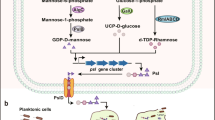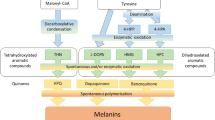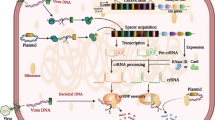Abstract
Quorum sensing (QS)-dependent gene regulation in bacteria performs a vital role in synchronization of cell-density-dependent functions. In Chromobacterium violaceum QS-dependent cviI/R regulatory genes are activated during the mid- or late-exponential phase of growth. However, sufficient evidence is lacking on the role of QS inhibitors on gene regulation at different phases of growth. Hence, we report the role of linalool, a natural monoterpenoid on QS mediated gene regulation at different stages of growth in C. violaceum by performing biosensor, growth kinetic and gene expression studies. In vitro and in vivo studies were performed for establishing role of linalool in reducing the virulence and infection by using HEK-293 T cell lines and Caenorhabditis elegans models respectively. C. violaceum CV026 with C6-HSL was used as control. The results showed linalool to be a QS inhibitor with an estimated IC50 of 63 µg/mL for violacein inhibition. At this concentration the cell density difference (delta OD600) of 0.14 from the compound was observed indicating the quorum concentration. The expression of cviI/R was initiated at mid-log phase (~ 18 h) and reached the maximum at 36 h in control whereas in treatment it remained significantly downregulated at all time points. The expression of violacein biosynthetic genes vioA, vioC, vioD and vioE was also downregulated by linalool. Infection studies with linalool showed higher survival rates in HEK-293T cell lines and C. elegans compared to the infection control. Taken together, this study proves linalool to be a QS inhibitor capable of attenuation of QS by controlling the cell density through cviI/R downregulation at the early phase of growth and hence offering scope for its application for controlling infections.






Similar content being viewed by others
Data availability
All relevant data are within the paper and its Supporting Information files.
References
Ahmed SA, Rudden M, Smyth TJ, Dooley JS, Marchant R, Banat IM (2019) Natural quorum sensing inhibitors effectively downregulate gene expression of Pseudomonas aeruginosa virulence factors. Appl Microbiol Biotechnol 103:3521–3535. https://doi.org/10.1007/s00253-019-09618-0
Alexpandi R, Prasanth MI, Ravi AV, Balamurugan K, Durgadevi R, Srinivasan R et al (2019) Protective effect of neglected plant Diplocyclos palmatus on quorum sensing mediated infection of Serratia marcescens and UV-A induced photoaging in model Caenorhabditis elegans. J Photochem Photobiol Biol 201:111637. https://doi.org/10.1016/j.jphotobiol.2019.111637
Burr LD, Rogers GB, Chen AC, Hamilton BR, Pool GF, Taylor SL et al (2016) Macrolide treatment inhibits Pseudomonas aeruginosa quorum sensing in non–cystic fibrosis bronchiectasis. An analysis from the Bronchiectasis and Low-Dose Erythromycin Study trial. Ann Am Thorac Soc 13:1697–1703. https://doi.org/10.1513/annalsats.201601-044oc
Burt SA, Ojo-Fakunle VT, Woertman J, Veldhuizen EJ (2014) The natural antimicrobial carvacrol inhibits quorum sensing in Chromobacterium violaceum and reduces bacterial biofilm formation at sub-lethal concentrations. PLoS ONE. https://doi.org/10.1371/journal.pone.0093414
Cámara M (2006) Quorum sensing: a cell-cell signalling mechanism used to coordinate behavioural changes in bacterial populations. In: Proceedings of the International Workshop on Membrane Computing. Springer, Berlin, Heidelberg, pp 42–48. https://doi.org/10.1007/11963516_3
Duarte A, Luís Â, Oleastro M, Domingues FC (2016) Antioxidant properties of coriander essential oil and linalool and their potential to control Campylobacter spp. Food Control 61:115–122. https://doi.org/10.1016/j.foodcont.2015.09.033
Durai S, Vigneshwari L, Balamurugan K (2013) Caenorhabditis elegans-based in vivo screening of bioactives from marine sponge-associated bacteria against Vibrio alginolyticus. J Appl Microbiol 115:1329–1342. https://doi.org/10.1111/jam.12335
FitzGerald ES, Luz NF, Jamieson AM (2020) Competitive cell death interactions in pulmonary infection: host modulation versus pathogen manipulation. Front Immunol 11:814. https://doi.org/10.3389/fimmu.2020.00814
Hoshino T (2011) Violacein and related tryptophan metabolites produced by Chromobacterium violaceum: biosynthetic mechanism and pathway for construction of violacein core. Appl Microbiol Biotechnol 91:1463–1475. https://doi.org/10.1007/s00253-011-3468-z
Jesudhasan PR, Cepeda ML, Widmer K, Dowd SE, Soni KA, Hume ME, Zhu J, Pillai SD (2010) Thranscriptome analysis of genes controlled by luxS/autoinducer-2 in Salmonella enterica serovar Typhimurium. Foodborne Pathog Dis 7:399–410. https://doi.org/10.1089/dpd.2009.0372
Kalia VC (2013) Quorum sensing inhibitors: an overview. Biotechnol Adv 31:224–245. https://doi.org/10.1016/j.biotechadv.2012.10.004
Kamaeva AA, Vasilchenko AS, Deryabin DG (2014) Atomic force microscopy reveals a morphological differentiation of Chromobacterium violaceum cells associated with biofilm development and directed by N-hexanoyl-L-homoserine lactone. PLoS ONE 9:e103741. https://doi.org/10.1371/journal.pone.0103741
Kamatou GP, Viljoen AM (2008) Linalool—a review of a biologically active compound of commercial importance. Nat Prod Commun. https://doi.org/10.1177/1934578X0800300727
Kanekar S, Fathima F, Rekha PD (2021) Carvone—a quorum sensing inhibitor blocks biofilm formation in Chromobacterium violaceum. Nat Prod Res 13:1–6. https://doi.org/10.1080/14786419.2021.1993214
Kashiwadani H, Higa Y, Sugimura M, Kuwaki T (2021) Linalool odor-induced analgesia is triggered by TRPA1-independent pathway in mice. Behavioural and Brain Functions 17:1–7. https://doi.org/10.1186/s12993-021-00176-y
Kerekes EB, Deák É, Takó M, Tserennadmid R, Petkovits T, Vágvölgyi C, Krisch J (2013) Anti-biofilm forming and anti-quorum sensing activity of selected essential oils and their main components on food-related micro-organisms. J Appl Microbiol 115:933–942. https://doi.org/10.1111/jam.12289
Kimyon O, Uluturk ZI, Nizalapur S, Lee M, Kutty SK, Beckmann S, Kumar N, Manefield M (2016) N-Acetylglucosamine inhibits LuxR, LasR and CviR based quorum sensing regulated gene expression levels. Front Microbiol 7:1313. https://doi.org/10.3389/fmicb.2016.01313
Kurmoo Y, Hook AL, Harvey D, Dubern JF, Williams P, Morgan SP et al (2020) Real time monitoring of biofilm formation on coated medical devices for the reduction and interception of bacterial infections. Biomater Sci 8:1464–1477. https://doi.org/10.1039/C9BM00875F
Lahiri D, Nag M, Dutta B, Dey S, Mukherjee D, Joshi SJ, Ray RR (2021) Antibiofilm and anti-quorum sensing activities of eugenol and linalool from Ocimum tenuiflorum against Pseudomonas aeruginosa Biofilm. J Appl Microbiol. https://doi.org/10.1111/jam.15171
Lazdunski AM, Ventre I, Sturgis JN (2004) Regulatory circuits and communication in Gram-negative bacteria. Nat Rev Microbiol 2:581–592. https://doi.org/10.1038/nrmicro924
Li XJ, Yang YJ, Li YS, Zhang WK, Tang HB (2016) α-Pinene, linalool, and 1-octanol contribute to the topical anti-inflammatory and analgesic activities of frankincense by inhibiting COX-2. J Ethnopharmacol 179:22–26. https://doi.org/10.1016/j.jep.2015.12.039
Lu L, Hume ME, Pillai SD (2005) Autoinducer-2-like activity in poultry-associated enteric bacteria in response to subtherapeutic antibiotic exposure. Avian Dis 49:74–80. https://doi.org/10.1637/7212-05200R
Lu L (2004) Autoinducer 2-based quorum sensing response of Escherichia coli to subtherapeutic tetracycline exposure. http://oaktrust.library.tamu.edu/bitstream/handle/1969.1/4198/etd-tamu-2004B-FSTC-Lu.pdf
Miki T, Iguchi M, Akiba K, Hosono M, Sobue T, Danbara H et al (2010) Chromobacterium pathogenicity island 1 type III secretion system is a major virulence determinant for Chromobacterium violaceum-induced cell death in hepatocytes. Mol Microbiol 77:855–872. https://doi.org/10.1111/j.1365-2958.2010.07248.x
Molina RD, Campos-Silva R, Macedo AJ, Blázquez MA, Alberto MR, Arena ME (2020) Antibiofilm activity of coriander (Coriander sativum L.) grown in Argentina against food contaminants and human pathogenic bacteria. Ind Crops Prod. https://doi.org/10.1016/j.indcrop.2020.112380
Mosmann T (1983) Rapid colorimetric assay for cellular growth and survival: application to proliferation and cytotoxicity assays. J Immunol Methods 65:55–63. https://doi.org/10.1016/0022-1759(83)90303-4
Mukherjee S, Bassler B (2019) Bacterial quorum sensing in complex and dynamically changing environments. Nat Rev Microbiol 17:371–382. https://doi.org/10.1038/s41579-019-0186-5
Ng WL, Bassler BL (2009) Bacterial quorum-sensing network architectures. Annu Rev Genet 43:197–222. https://doi.org/10.1146/annurev-genet-102108-134304
Ngenge TA, Kucukaydin S, Ceylan O, Duru ME (2021) Evaluation of enzyme inhibition and anti-quorum sensing potentials of Melaleuca alternifolia and Citrus sinensis essential oils. Nat Prod Commun. https://doi.org/10.1177/1934578X211044565
Ouyang J, Sun F, Feng W, Sun Y, Qiu X, Xiong L et al (2016) Quercetin is an effective inhibitor of quorum sensing, biofilm formation and virulence factors in Pseudomonas aeruginosa. J Appl Microbiol 120:966–974. https://doi.org/10.1111/jam.13073
Papenfort K, Bassler B (2016) Quorum sensing signal–response systems in Gram-negative bacteria. Nat Rev Microbiol 14:576–588. https://doi.org/10.1038/nrmicro.2016.89
Park SN, Lim YK, Freire MO, Cho E, Jin D, Kook JK (2012) Antimicrobial effect of linalool and α-terpineol against periodontopathic and cariogenic bacteria. Anaerobe 18(3):369–372. https://doi.org/10.1016/j.anaerobe.2012.04.001
Pereira I, Severino P, Santos AC, Silva AM, Souto EB (2018) Linalool bioactive properties and potential applicability in drug delivery systems. Colloids Surf b: Biointerfaces 171:566–578. https://doi.org/10.1016/j.colsurfb.2018.08.001
Ravichandran V, Zhong L, Wang H, Yu G, Zhang Y, Li A (2018) Virtual screening and biomolecular interactions of CviR-based quorum sensing inhibitors against Chromobacterium violaceum. Front Cell Infect Microbiol 8:292. https://doi.org/10.3389/fcimb.2018.00292
Rekha PD, Vasavi HS, Vipin C, Saptami K, Arun AB (2017) A medicinal herb Cassia alata attenuates quorum sensing in Chromobacterium violaceum and Pseudomonas aeruginosa. Lett Appl Microbiol 64:231–238. https://doi.org/10.1111/lam.12710
Ruer S, Pinotsis N, Steadman D, Waksman G, Remaut H (2015) Virulence-targeted antibacterials: concept, promise, and susceptibility to resistance mechanisms. Chem Biol Drug Des 86:379–399. https://doi.org/10.1111/cbdd.12517
Rutherford ST, Bassler BL (2012) Bacterial quorum sensing: its role in virulence and possibilities for its control. Cold Spring Harb Perspect Med 2:a012427. https://doi.org/10.1101/cshperspect.a012427
Saxena P, Joshi Y, Rawat K, Bisht R (2019) Biofilms: architecture, resistance, quorum sensing and control mechanisms. Indian J Microbiol 59:3–12. https://doi.org/10.1007/s12088-018-0757-6
Sharma K, Bose SK, Chhibber S, Harjai K (2020) Exploring the therapeutic efficacy of zingerone nanoparticles in treating biofilm-associated pyelonephritis caused by Pseudomonas aeruginosa in the murine model. Inflammation 43:2344–2356. https://doi.org/10.1007/s10753-020-01304-y
Sikdar R, Elias M (2020) Quorum quenching enzymes and their effects on virulence, biofilm, and microbiomes: a review of recent advances. Expert Rev Anti Infect Ther 18:1221–1233. https://doi.org/10.1080/14787210.2020.1794815
Solano C, Echeverz M, Lasa I (2014) Biofilm dispersion and quorum sensing. Curr Opin Microbiol 18:96–104. https://doi.org/10.1016/j.mib.2014.02.008
Soni KA, Lu L, Jesudhasan PR, Hume ME, Pillai SD (2008) Influence of autoinducer-2 (AI-2) and beef sample extracts on E. coli O157:H7 survival and gene expression of virulence genes yadK and hhA. J Food Sci 73:M135–M139. https://doi.org/10.1111/j.1750-3841.2007.00654.x
Stepanovic S, Vukovic D, Hola V, Bonaventura GD, Djukic S, Cirkovic I, Ruzicka F (2007) Quantification of biofilm in microtiter plates: overview of testing conditions and practical recommendations for assessment of biofilm production by staphylococci. APMIS 115:891–899. https://doi.org/10.1111/j.1600-0463.2007.apm_630.x
Suresh S, Alva PP, Premanath R (2021) Modulation of quorum sensing-associated virulence in bacteria: carbohydrate as a key factor. Arch Microbiol 28:1. https://doi.org/10.1007/s00203-021-02235-4
Tapia-Rodriguez MR, Hernandez-Mendoza A, Gonzalez-Aguilar GA, Martinez-Tellez MA, Martins CM, Ayala-Zavala JF (2017) Carvacrol as potential quorum sensing inhibitor of Pseudomonas aeruginosa and biofilm production on stainless steel surfaces. Food Control 75:255–61. https://doi.org/10.1007/s12079-019-00516-8
Tarighi S, Taheri P (2011) Different aspects of bacterial communication signals. World J Microbiol Biotechnol 27:1267–1280. https://doi.org/10.1007/s11274-010-0575-4
Varia RD, Patel JH, Modi FD, Vihol PD, Bhavsar SK (2020) In vitro and in vivo antibacterial and anti-inflammatory properties of linalool. Int J Curr Microbiol Appl Sci 9:1481–9. https://doi.org/10.20546/ijcmas.2020.909.187
Vattem DA, Mihalik K, Crixell SH, McLean RJ (2007) Dietary phytochemicals as quorum sensing inhibitors. Fitoterapia 1(78):302–310. https://doi.org/10.1016/j.fitote.2007.03.009
Venturi V (2006) Regulation of quorum sensing in Pseudomonas. FEMS Microbiol Rev 30:274–291. https://doi.org/10.1111/j.1574-6976.2005.00012.x
Vikram A, Jayaprakasha GK, Jesudhasan PR, Pillai SD, Patil BS (2010) Suppression of bacterial cell-cell signalling, biofilm formation and type III secretion system by citrus flavonoids. J Appl Microbiol 109:515–527. https://doi.org/10.1111/j.1365-2672.2010.04677.x
Vipin C, Mujeeburahiman M, Ashwini P, Arun AB, Rekha PD (2019) Anti-biofilm and cytoprotective activities of quercetin against Pseudomonas aeruginosa isolates. Lett Appl Microbiol 68:464–471. https://doi.org/10.1111/lam.13129
Vipin C, Saptami K, Fida F, Mujeeburahiman M, Rao SS, Arun AB, Rekha PD (2020) Potential synergistic activity of quercetin with antibiotics against multidrug-resistant clinical strains of Pseudomonas aeruginosa. PLoS ONE 15:e0241304. https://doi.org/10.1371/journal.pone.0241304
Wang S, Payne GF, Bentley WE (2020) Quorum sensing communication: molecularly connecting cells, their neighbours, and even devices. Annu Rev Chem Biomol 11:447–468. https://doi.org/10.1146/annurev-chembioeng-101519-124728
Wang W, Li D, Huang X, Yang H, Qiu Z, Zou L, Liang Q, Shi Y, Wu Y, Wu S, Yang C (2019) Study on antibacterial and quorum-sensing inhibition activities of Cinnamomum camphora leaf essential oil. Molecules 24:3792. https://doi.org/10.3390/molecules24203792
Wayne PA (2010) Clinical and Laboratory Standards Institute: Performance standards for antimicrobial susceptibility testing: 20th informational supplement. CLSI document M100-S20. https://ci.nii.ac.jp/naid/10030235967/
Whitehead N, Barnard A, Slater H, Simpson N, Salmond G (2001) Quorum-sensing in Gram-negative bacteria. FEMS Microbiol Rev 25:365–404. https://doi.org/10.1111/j.1574-6976.2001.tb00583.x
Wu S, Liu J, Liu C, Yang A, Qiao J (2020) Quorum sensing for population-level control of bacteria and potential therapeutic applications. Cell Mol Life Sci 77:1319–1343. https://doi.org/10.1007/s00018-019-03326-8
Zhang LH, Dong YH (2004) Quorum sensing and signal interference: diverse implications. Mol Microbiol 53:1563–1571. https://doi.org/10.1111/j.1365-2958.2004.04234.x
Acknowledgements
The authors thank Ms. Fida Fathima for the technical support provided during in vitro infection studies and Mr. Sukesh Kumar for helping in the execution of the C. elegans infection studies.
Funding
The first author Ms. Kanekar Saptami is recipient of Indian Council of Medical Research-Senior Research Fellowship (Reg ID: 2019-5152/CMB/BMS).
Author information
Authors and Affiliations
Contributions
KS designed and executed all the experiments, analysed the results, and prepared the manuscript. RPD framed the study, designed all experiments, analysed the data, and prepared the manuscript. Both the authors approved the manuscript for submission.
Corresponding author
Ethics declarations
Conflict of interest
The authors declare that they have no conflict of interest.
Additional information
Publisher's Note
Springer Nature remains neutral with regard to jurisdictional claims in published maps and institutional affiliations.
Supplementary Information
Below is the link to the electronic supplementary material.
Rights and permissions
About this article
Cite this article
Kanekar, S., Devasya, R.P. Growth-phase specific regulation of cviI/R based quorum sensing associated virulence factors in Chromobacterium violaceum by linalool, a monoterpenoid. World J Microbiol Biotechnol 38, 23 (2022). https://doi.org/10.1007/s11274-021-03208-x
Received:
Accepted:
Published:
DOI: https://doi.org/10.1007/s11274-021-03208-x




